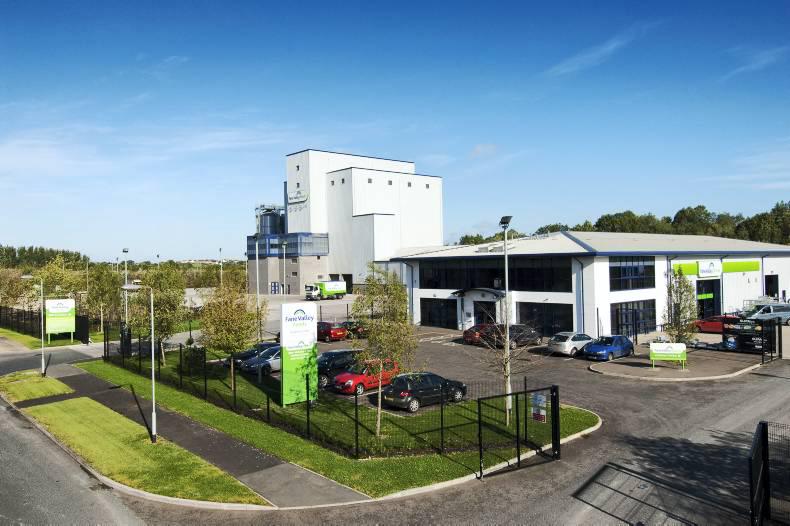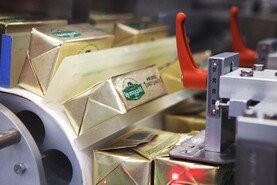Two joint ventures have been announced by the agricultural co-operatives Fane Valley and Lakeland Dairies in a radical move aimed at adding scale and consolidating two specific parts of their operations – dairy processing and agribusiness (animal feed and farm supplies).
No money changes hands and there is no disclosure at this stage of the respective shareholdings in the joint ventures. These have been broadly agreed, although still subject to completion of due diligence valuations of the assets that are being put into each venture. These assets include the land and facilities as well as management and workforce in each case.
The two dairy processing businesses will become one joint venture (JV) managed by Lakeland, while the animal feed manufacturing and stores businesses will be amalgamated under the management of Fane Valley.
Other parts of the Fane Valley Group, including red meat, animal by-products, fat processing and oat milling, are not included in either JV and will continue to operate as divisions within that group. Those businesses include beef and lamb processor Linden Foods, and the group’s joint ventures in Slaney Foods and Irish Country Meats, the largest processor of lambs in Ireland.
Dairy joint venture
The dairy JV will process over 1 billion litres of milk annually, with projected yearly turnover of €670m (£480m). All of the assets and staff of Fane Valley Dairies (Armaghdown Creameries Ltd) based at Banbridge in Co Down will become part of this JV. The aim is to have all suppliers paid according to the Lakeland Dairies pricing schedule for milk purchased from 1 November this year, including winter bonuses.
Lakeland chief executive Michael Hanley told the Irish Farmers Journal that the Banbridge site is excellent, with a good milk pool and “great seasonality, which allows us to serve customers all year round”. He said that Lakeland has been a significant buyer of third party milk and this JV will have less need for this.
Hanley said Lakeland management will drive dairy synergies and provide the highest possible milk prices to producers. The purpose of the dairy JV is to increase scale and efficiency, with further potential to grow and compete more intensively on a global basis.
Fane Valley will be a partner and shareholder in the dairy JV, with direct representation on the board of Lakeland Dairies, but it is clearly not a 50/50 JV.
Fane Valley chief executive Trevor Lockhart said that the respective sizes of the two dairy businesses being put together point to Lakeland assuming responsibility. Currently, Fane Valley has a milk pool of close to 250m litres in NI and capacity to produce over 30,000 tonnes of milk powders per year. Its Mourne Maid brand is familiar in markets in Africa, Asia and South America. Lakeland collects over 800m litres across 15 counties, including 330m litres in NI.
Lakeland Dairies currently manufactures 25,000t of butter and 90,000t of milk powder per year and is adding powder-making capacity of 40,000t with the construction of a new €36m (£28m) dryer at Bailieboro, Co Cavan. The business recently invested €10m (£8m) in a global logistics centre at its dairy foodservice site in Newtownards, Co Down (Pritchitt Foods site).

Agribusiness JV
Lockhart said the agribusiness JV will involve a new holding company, with a feed division and a stores division, each of which will have a northern and southern section.
In this JV, Fane Valley has responsibility for the management, while Lakeland Dairies will be a partner and shareholder with representation on the board of the new company. It will be a business with capacity to manufacture 500,000t of animal feed per year, including the 310,000t capacity of Fane Valley Feeds through its mills at Omagh and Newry along with Lakeland’s 190,000t mill at Lough Egish. Fane Valley is the North’s second-largest manufacturer of feed, supplying ruminant, pigs and poultry sectors.
Together they have greater potential buying power and expect to deliver across a wide area, with tonnage increasing as demand for feed rises in the Republic. Projected annual revenues are estimated at €175m (£125m).
Trading will continue in NI as Fane Valley Feeds and Fane Valley Stores, of which there are 13 outlets. The two Lakeland Stores south of the border and the brands of Lakeland Feeds will continue to be presented to customers for the foreseeable future. Fane Valley has become the largest retail distributor of animal health and farm supplies in NI, with the successful expansion of its stores, and there is potential for growth with a similar business model in the Republic.
In a joint statement, the two co-ops described it as a strategic development, with an indication that a full merger of the two societies could be considered in the future – subject to the approval of the members.
The announcement comes hard on the heels of the full merger agreement between the dairy co-ops Town of Monaghan and Ballyrashane to form LacPatrick Co-op. All four of the co-operative societies making these moves were formed over 100 years ago. It is a sign of pressures within the sector that they are seeking to co-operate to survive in a very competitive market.
Lockhart said that negotiations to set up the new structures had been ongoing since before milk prices crashed and described the agreement as “far-sighted”. He said it would allow the joint venture partners to develop an even more competitive market position and combined strength of the two co-ops would ensure success of their agribusiness and dairy operations.
Read more
James Campbell's analysis: Pressure concentrates minds
Two joint ventures have been announced by the agricultural co-operatives Fane Valley and Lakeland Dairies in a radical move aimed at adding scale and consolidating two specific parts of their operations – dairy processing and agribusiness (animal feed and farm supplies).
No money changes hands and there is no disclosure at this stage of the respective shareholdings in the joint ventures. These have been broadly agreed, although still subject to completion of due diligence valuations of the assets that are being put into each venture. These assets include the land and facilities as well as management and workforce in each case.
The two dairy processing businesses will become one joint venture (JV) managed by Lakeland, while the animal feed manufacturing and stores businesses will be amalgamated under the management of Fane Valley.
Other parts of the Fane Valley Group, including red meat, animal by-products, fat processing and oat milling, are not included in either JV and will continue to operate as divisions within that group. Those businesses include beef and lamb processor Linden Foods, and the group’s joint ventures in Slaney Foods and Irish Country Meats, the largest processor of lambs in Ireland.
Dairy joint venture
The dairy JV will process over 1 billion litres of milk annually, with projected yearly turnover of €670m (£480m). All of the assets and staff of Fane Valley Dairies (Armaghdown Creameries Ltd) based at Banbridge in Co Down will become part of this JV. The aim is to have all suppliers paid according to the Lakeland Dairies pricing schedule for milk purchased from 1 November this year, including winter bonuses.
Lakeland chief executive Michael Hanley told the Irish Farmers Journal that the Banbridge site is excellent, with a good milk pool and “great seasonality, which allows us to serve customers all year round”. He said that Lakeland has been a significant buyer of third party milk and this JV will have less need for this.
Hanley said Lakeland management will drive dairy synergies and provide the highest possible milk prices to producers. The purpose of the dairy JV is to increase scale and efficiency, with further potential to grow and compete more intensively on a global basis.
Fane Valley will be a partner and shareholder in the dairy JV, with direct representation on the board of Lakeland Dairies, but it is clearly not a 50/50 JV.
Fane Valley chief executive Trevor Lockhart said that the respective sizes of the two dairy businesses being put together point to Lakeland assuming responsibility. Currently, Fane Valley has a milk pool of close to 250m litres in NI and capacity to produce over 30,000 tonnes of milk powders per year. Its Mourne Maid brand is familiar in markets in Africa, Asia and South America. Lakeland collects over 800m litres across 15 counties, including 330m litres in NI.
Lakeland Dairies currently manufactures 25,000t of butter and 90,000t of milk powder per year and is adding powder-making capacity of 40,000t with the construction of a new €36m (£28m) dryer at Bailieboro, Co Cavan. The business recently invested €10m (£8m) in a global logistics centre at its dairy foodservice site in Newtownards, Co Down (Pritchitt Foods site).

Agribusiness JV
Lockhart said the agribusiness JV will involve a new holding company, with a feed division and a stores division, each of which will have a northern and southern section.
In this JV, Fane Valley has responsibility for the management, while Lakeland Dairies will be a partner and shareholder with representation on the board of the new company. It will be a business with capacity to manufacture 500,000t of animal feed per year, including the 310,000t capacity of Fane Valley Feeds through its mills at Omagh and Newry along with Lakeland’s 190,000t mill at Lough Egish. Fane Valley is the North’s second-largest manufacturer of feed, supplying ruminant, pigs and poultry sectors.
Together they have greater potential buying power and expect to deliver across a wide area, with tonnage increasing as demand for feed rises in the Republic. Projected annual revenues are estimated at €175m (£125m).
Trading will continue in NI as Fane Valley Feeds and Fane Valley Stores, of which there are 13 outlets. The two Lakeland Stores south of the border and the brands of Lakeland Feeds will continue to be presented to customers for the foreseeable future. Fane Valley has become the largest retail distributor of animal health and farm supplies in NI, with the successful expansion of its stores, and there is potential for growth with a similar business model in the Republic.
In a joint statement, the two co-ops described it as a strategic development, with an indication that a full merger of the two societies could be considered in the future – subject to the approval of the members.
The announcement comes hard on the heels of the full merger agreement between the dairy co-ops Town of Monaghan and Ballyrashane to form LacPatrick Co-op. All four of the co-operative societies making these moves were formed over 100 years ago. It is a sign of pressures within the sector that they are seeking to co-operate to survive in a very competitive market.
Lockhart said that negotiations to set up the new structures had been ongoing since before milk prices crashed and described the agreement as “far-sighted”. He said it would allow the joint venture partners to develop an even more competitive market position and combined strength of the two co-ops would ensure success of their agribusiness and dairy operations.
Read more
James Campbell's analysis: Pressure concentrates minds







 This is a subscriber-only article
This is a subscriber-only article












SHARING OPTIONS: